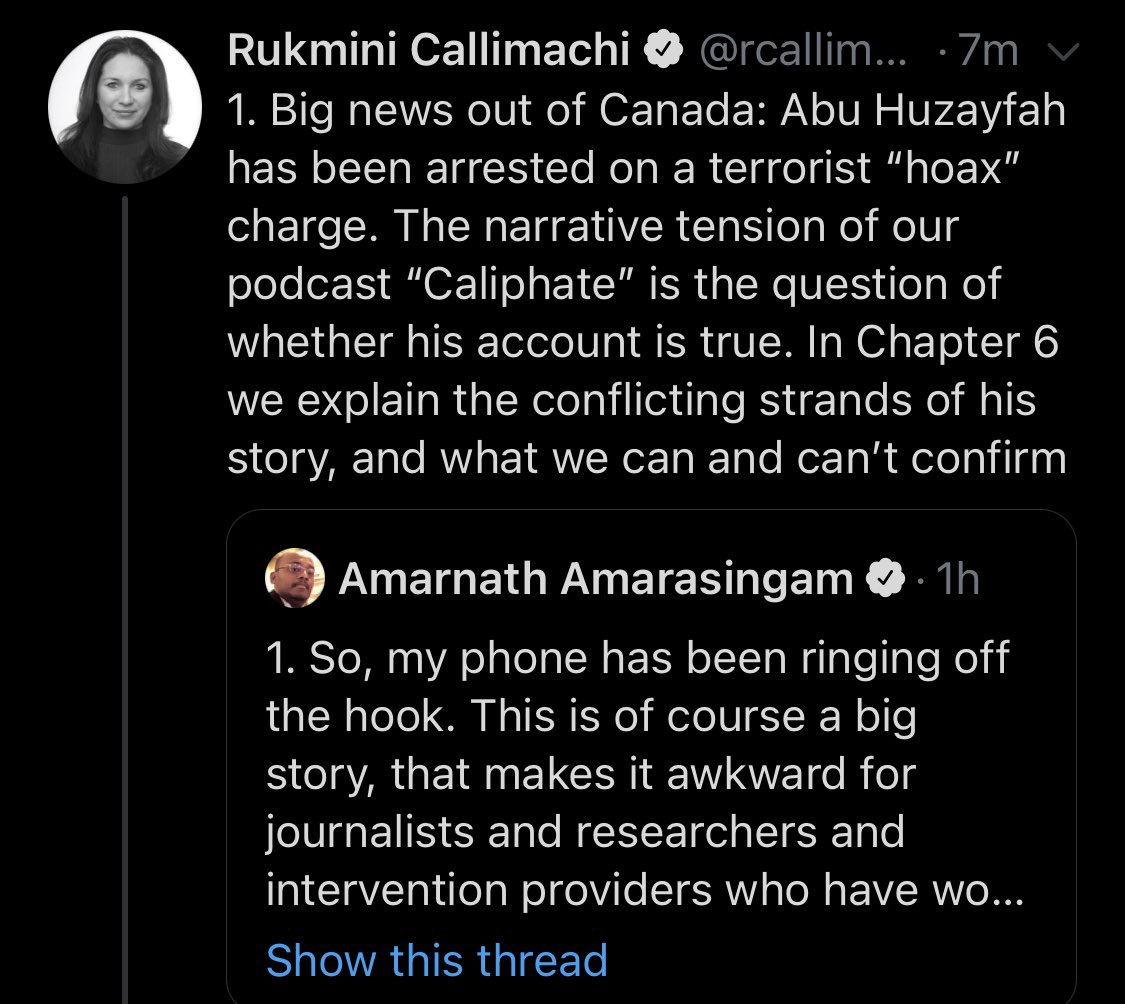This is stunning news. Will the @nytimes retract Caliphate given that one of its main subjects has been arrested for making up the story? https://twitter.com/StewGlobal/status/1309581575412232198
Apparently @CBCNews called this guy’s credibility into question more than 2 years ago, when Caliphate was racking up awards. This is a journalistic scandal. I’ve long been saying that stories about the Middle East don’t receive nearly enough scrutiny: https://www.cbc.ca/news/canada/isis-abu-huzaifa-investigators-1.4669769
Reporting about Arabs, Muslims, and the Middle East, especially sensationalistic stories, is believed because it confirms our biases and yes, orientalist and racist pre-existing ideas and beliefs. There hasn’t been enough written about this since Edward Said’s “Covering Islam.”
It’s a cop out to use “narrative tension” to explain away your main subject getting arrested for a “hoax.” If he made the story up, then the story probably never should have been told by a journalistic institution. But why let truth get in the way of a titillating story?
After the Las Vegas shooting, this same reporter engaged in reckless speculation for days that the shooter Stephen Paddock had converted to Islam. It was stenography based on unverified ISIS chatroom talk. There are no consequences for these mistakes. https://theintercept.com/2020/09/22/stephen-paddock-las-vegas-shooting-far-right/
What’s changed in journalism that now makes it acceptable to release a series despite serious q’s about subject’s credibility, in the name of “narrative tension”.? This American Life retracted Mike Daisey’s Apple in China story for similar inconsistencies https://www.npr.org/sections/thetwo-way/2012/03/16/148761812/this-american-life-retracts-mike-daiseys-apple-factory-story
Another example of problematic reporting by Rukmini Callimachi. Experts say documents she based a story on last year were likely forged. NYT responded... by having her write a follow up. Definitely feels like there are different standards for Middle East reporting. More here https://twitter.com/hxhassan/status/1189956502523645953
https://twitter.com/hxhassan/status/1189956502523645953
 https://twitter.com/hxhassan/status/1189956502523645953
https://twitter.com/hxhassan/status/1189956502523645953
We have become so inured to framing that pathologizes Arabs/Muslims that we don’t even notice it. But also there’s fear to publicly critique fellow reporters esp those at hallowed institutions. Fear that you won’t get hired or win awards or be part of the club. So there’s silence https://twitter.com/AliaMalek/status/1309671600984383491
A podcast downloaded 30 million times that had at its center a subject who was a proven liar had real-life consequences. It apparently ended the debate over repatriation in Canada. https://twitter.com/AmarAmarasingam/status/1309626517786370049
Colleague points out that the Caliphate fiasco is actually worse than the Mike Daisey story because they’re saying they *knew* there were serious holes in the story but built an entire podcast around it anyway. Concerned that cases like this undermine public’s trust in journalism
Am I missing something? She’s upset that a five year old orphan wasn’t labeled an ISIS child? And she doesn’t mention that it was the reaction to her podcast - now believed to have been based on a largely phony story - that impeded this repatriation to begin with.
RE: double standard when it comes to reporting from the Middle East. As @se_parkinson points out, there should be an ethical conversation about whether it was appropriate to ask a Yazidi rape survivor to confirm the voice of her alleged rapist. Would this practice fly in the US?
In a 459-word editor's note, the @nytimes *appears* to retract the Caliphate podcast, or at least the bulk of which which they now acknowledge was largely based on the testimony of a fabulist... without actually using the word "retract." https://www.nytimes.com/2018/09/20/podcasts/caliphate-transcript-prologue-the-mission.html
This is one of the biggest media failures in recent memory but it appears that no one is going to lose their job. Rukmini Callimachi, the main reporter behind the podcast, described as a "fine" reporter, will no longer cover terrorism. https://www.nytimes.com/2020/12/18/business/media/new-york-times-caliphate-podcast.html
Since there seems to be no retribution for a monumental failure like Caliphate, which was downloaded by millions, helped shape narratives and policies, proves my original point that there's a double standard when it comes to media coverage of the Middle East and lack of scrutiny.
The @nytimes takeaway is that a terrorism editor should have overseen the Caliphate podcast to catch problems with the source's veracity. No mention of how biases and blind spots in covering terrorism/the Middle East lead to confirmation bias. Not ready for that conversation.
This @npr piece on the Caliphate retraction points out that Callimachi has “frequently appeared on NPR.” In this NPR interview from 2015 she says that parents supporting daughters who were raped is unusual in the Middle East or “this part of the world.” https://www.npr.org/2020/12/18/944594193/new-york-times-retracts-hit-podcast-series-caliphate-on-isis-executioner
This attitude towards and ignorance of the Middle East, which often manifests in casual racism, is so engrained that most people don’t even notice it. It’s just a final thought in a widely circulated radio morning rush hour interview.
Despite the fact that it was largely based on fabrications @nytimes is not retracting Caliphate. This is bizarre considering the podcast aims to answer the question “Who are we really fighting” based largely on “Abu Huzayfah” false account. Why won’t they retract those episodes? https://twitter.com/mikiebarb/status/1339941435026665476
The @nytimes appears to be standing behind the eps of Caliphate that don't feature "Abu Huzayfah." I believe there should be ethics conversations about those too. Would a reporter in the U.S. ask a rape survivor to speak w her rapist by phone as Callimachi did with a Yazidi woman
Not to mention the ethics of stuffing thousands of documents into garbage bags, removing them from Iraq without permission from authorities and not redacting the names of Iraqi civilians and minors. https://theintercept.com/2018/05/23/isis-files-podcast-new-york-times-iraq/
In the podcast about the Caliphate mess, Dean Baquet says that Shehroze Chaudhry being on “no-fly list” was one of factors that convinced them of his credibility because “it’s not easy to get on.” https://podcasts.apple.com/us/podcast/caliphate/id1357657583?i=1000502817283

 Read on Twitter
Read on Twitter







